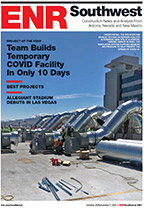
Las Vegas Sands Corp. is planning a $65-billion, 36,000-room casino-hotel complex on the sandy outskirts of Alcorcón, Spain, eight miles southwest of Madrid. After a year of deliberation, Madrid, the capital, recently beat out Barcelona as host city for the proposed 12-hotel, four-mile-long "EuroVegas" development.
At first glance, Spain would seem to be a risky bet for a gaming-based megaresort location: The country has a stagnant economy burdened by heavy debt and a 25% unemployment rate. But Las Vegas Sands Chairman and CEO Sheldon G. Adelson, 79, is confident the investment will pay off. "The regional government of Madrid has been a strong advocate for this potential development, and we are appreciative of the energy they have brought to this process," Adelson said in a statement. "Barcelona is an outstanding tourism destination, and choosing Madrid over Barcelona was not an easy selection."
The 10-year, six-casino project calls for 18,000 slot machines, three golf courses and a convention center. Other amenities include a 15,000-seat concert hall, shopping centers, bars and restaurants. Las Vegas Sands Corp. (NYSE: LVS) plans to invest up to $22 billion in the multi-phase development and limit its equity stake at 35%, pushing the total price tag to about $65 billion. Las Vegas Sands is exploring "financing options from the capital markets for the project," the company said in a statement.
"[Las Vegas Sands] believes that Europe, as a whole, is underserved when it comes to Vegas-style resorts. They believe there will be a huge demand,” says David Schwartz, director of the Center for Gaming Research at the University of Nevada, Las Vegas. “It’s definitely not a slam dunk. [Las Vegas Sands] wants to get into the European market where a lot of operators have previously kicked the tires, including Harrah’s in Spain and Steve Wynn in Monte Carlo.”
The undertaking is expected to boost Spain's economy by creating 260,000 new jobs, according to a Las Vegas Sands-commissioned study by Boston Consulting Group. The project, however, comes with some caveats. For example, Adelson wants Spain's laws amended to let gamblers smoke inside the casinos. Further, Adelson wants a 10-year tax waiver, relaxed unionization requirements and new zoning regulations that forgo building-height restrictions.
Critics, meanwhile, fear EuroVegas will attract prostitution and organized crime and encourage gambling addiction and financial distress. Hundreds of pan-banging demonstrators carrying signs protested the planned project in central Madrid on Sept. 8. Adleson, however, is accustomed to high-profile, costly fights.
Federal officials are currently looking into Las Vegas Sands activities in China after former Macau operations president, Steven C. Jacobs, filed a wrongful-termination lawsuit in 2010; the suit charges, among other things, that Jacobs had been pressured to exercise improper leverage over government officials and ignore organized crime figures operating inside its casinos. U.S. Justice Dept. and Securities and Exchange Commission investigators are reviewing possible violations of the Foreign Corrupt Practices Act.
Las Vegas Sands Corp. last year became the world's largest casino company with $1.27 billion in profits in 2011. The company’s gaming empire stretches to Singapore and Macao, where sales are 13% of local gross domestic product. It also runs several Las Vegas casinos, but 90% of profits come from Asia.
Adelson, whose net worth is estimated at $24.9 billion according to Forbes magazine, has been a vocal and frequent critic of President Obama. He gave $10 million to support former presidential hopeful Newt Gingrich and has pledged $100 million to aid Mitt Romney's GOP campaign for the White House.


Post a comment to this article
Report Abusive Comment